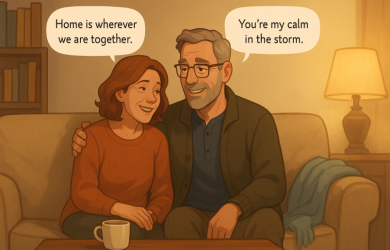7 Ways to Address Fear in Relationships & Support Your Partner

Heal & Grow Daily for a Happier Relationship
Subscribe FREEKey Takeaways
Marriage.com AI Quick Summary
Fear in relationships—it’s more common than we think. Sometimes, it whispers in the background; other times, it roars, making even the strongest bonds feel shaky. Maybe it’s fear of abandonment, rejection, or not being “enough.”
Maybe past wounds linger, making it hard to trust fully. Whatever the reason, fear has a way of creeping in, affecting the way we love, communicate, and show up for each other.
If your partner struggles with fear, you might feel helpless at times… unsure of what to say or do.
You want to be supportive, but how?
Love isn’t about fixing someone’s fears—it’s about holding space, offering reassurance, and creating safety in the little moments.
A gentle touch, an understanding nod, or simply listening can make all the difference. Because at the heart of it all, we’re human—just trying to love and be loved without fear getting in the way.
What is fear in relationships?
Relationship fears are often associated with past traumas that have caused emotional scars, leading to an eagerness to avoid negative experiences. These fears may stem from childhood experiences, past relationships, or personal insecurities that have yet to heal.
Fear is a biochemical reaction in the brain that occurs when an individual feels threatened. The emotional responses to fear are personalized based on a persons past.
How does fear develop in relationships?
Fear doesn’t appear out of nowhere. It builds over time, sometimes subtly and sometimes suddenly. Here are some ways it can develop:
- Past heartbreaks: Betrayal, cheating, or painful breakups can create trust issues.
- Childhood trauma: Growing up in an unstable home environment can lead to deep-seated fears of abandonment or rejection.
- Low self-esteem: Feeling unworthy or inadequate can make people afraid of losing their partner.
- Unhealthy relationship patterns: If someone has experienced toxic or manipulative relationships before, they may carry those fears forward.
Understanding the root of fear is the first step in overcoming it.
5 common fears in relationships one may face
Fear shows up in different ways—sometimes loud, sometimes quiet. Fear of abandonment, betrayal, or not being “enough” can weigh heavy on the heart. Some fear losing themselves, while others worry love will fade.
And then there’s the fear of being indeed seen.
What if they don’t love the real you?
1. Fear of abandonment
A deep, overwhelming worry that your partner might leave you or reject you. This fear can make you overly clingy, overly dependent, or anxious about being alone.
It may stem from past experiences of loss or emotional neglect, making it hard to trust stability in relationships.
2. Fear of betrayal
A lingering fear that your partner will break your trust, deceive you, or hurt you emotionally. This often comes from past experiences of dishonesty, infidelity, or emotional wounds.
It can lead to difficulty in trusting, overanalyzing situations or feeling guarded even in a loving relationship.
3. Fear of isolation
https://www.shutterstock.com/image-photo/offended-upset-woman-girlfriend-offense-problem-2580621527
A strong fear of feeling emotionally disconnected or lonely, even when in a relationship. This can make you seek constant validation, reassurance, or closeness to avoid feeling abandoned.
It may cause distress when alone, leading to overanalyzing interactions or fearing emotional distance.
4. Fear of inadequacy
A painful belief that you are not “good enough” for your partner leads to self-doubt, anxiety, and insecurity.
You may constantly compare yourself to others, feel unworthy of love, or struggle with low self-esteem, fearing that you will never measure up to expectations.
5. Fear of failure
A deep concern that the relationship will eventually fall apart, no matter how much effort you put in.
This fear can lead to perfectionism, overcompensating, or even avoiding emotional intimacy to protect yourself from disappointment. It may stem from past failed relationships or personal fears of rejection.
How does fear affect relationships ?
Fear can deeply affect how people behave, communicate, and connect in relationships. It creates insecurity, emotional withdrawal, and control issues, leading individuals to question their partner’s feelings or seek constant reassurance.
Unresolved fears often result in arguments and misunderstandings, making it harder to maintain trust and emotional closeness.
Fear can also create a cycle of emotional distance, where one partner withdraws, making the other feel unloved or unwanted. This can lead to self-sabotage, with individuals picking fights, avoiding intimacy, or ending relationships prematurely out of fear. If left unaddressed, fear can weaken the foundation of a relationship.
Studies show that insecurity in a relationship can lead to heightened focus on actions, making them feel more significant and memorable. It impacts how people connect and respond to one another, often creating misunderstandings or emotional distance.
5 signs that the fear is affecting your relationship
Fear can present itself in several ways within a relationship, often shaping the way we communicate, set boundaries, and express our needs. It can create emotional distance, misunderstandings, and even patterns of self-sabotage.
To stop living in fear and build healthier connections, you first need to recognize the 5 signs that may be affecting your relationship.
1. Heightened awareness and hypervigilance
If fear is a factor in the relationship, you may notice behavioral changes, such as constantly being on high alert for potential issues or threats. This increased hypervigilance can make it difficult to relax and trust the natural flow of the relationship.
2. Obsessing over small things
Fear can cause you to fixate on details that previously wouldn’t have bothered you. Minor actions, words, or situations may feel magnified, leading to overthinking and unnecessary stress in the relationship.
3. Increased irritability and terseness
Fear can manifest as frustration, making you more irritable or short-tempered in conversations. Even simple interactions may feel tense, as underlying anxiety influences your emotional responses.
4. Intrusive fear-driven thoughts
Fear doesn’t just affect behavior—it also shapes your thoughts. You may find yourself obsessing over specific fears, replaying worst-case scenarios in your mind, or struggling to focus on anything else.
5. Excessive worry about your partner’s actions
Fear in relationships can lead to constant worry about your partner—where they are, what they’re doing, and whether they’re being honest. These thoughts can create anxiety, even when there’s no real reason for concern.
7 ways to overcome fear in relationships & support your partner
Fear is inevitable. From the fear of rejection to loss to being vulnerable, addressing these fears can strengthen your relationship. Here are 7 ways to handle fear of romantic relationships and support your partner.
1. Talk it out
Holding in your fears can make them feel even heavier. Find a quiet, safe moment to gently express what’s on your mind. Let your partner in—sharing builds connection.
And remember, listening to each other with patience and without judgment is just as important as speaking.
- How to do it: “Use statements like ‘I’ve been feeling anxious lately, and I think it might help if I shared some of what’s on my mind.’
2. Listen with an open heart
When your partner opens up about their fears, truly listen. Even if you don’t fully understand or agree, their feelings are real to them.
Try to see things from their perspective, offer reassurance, and let them know they’re not alone. Sometimes, feeling heard is the greatest comfort.
- How to do it: Put down your phone and make eye contact. Nod to show you’re listening. Respond to what you’re hearing.
3. Be patient
Healing fear in relationships doesn’t happen overnight. Give yourself and your partner grace—progress takes time.
There’s no need for quick fixes; what matters is moving forward, even in small steps. Trust that patience, understanding, and consistency will help create a stronger, safer connection.
- How to do it: Celebrate small victories. Acknowledge their efforts to overcome their fears. Offer consistent support, even when it’s challenging.
4. Focus on the positive
Worries can be overwhelming, but don’t let them overshadow the love you share. Take a moment to appreciate what’s working, the little joys, and the strength you have as a couple.
Celebrate the moments that make you feel connected—they’re just as important as the challenges.
- How to do it: Create a ‘gratitude jar’ where you both write down things you appreciate about each other, plan fun activities together, and remind each other of happy memories.
5. Reassure each other
A few kind words can mean everything. Remind your partner why they matter to you, that you love them, and that you’re here for them. Sometimes, just knowing they’re not alone in their fears can bring a sense of comfort and security.
- How to do it: Say ‘I love you’ and mean it. Offer physical affection like hugs and cuddles, help your partner with everyday tasks, and watch together your favorite movies.
Watch this TED Talk by renowned relationship expert John Gottman as he discusses the importance of positive interactions and how small gestures can significantly impact relationship satisfaction:
6. Seek help if needed
If fear feels too heavy or starts affecting your relationship, reaching out for help can be a sign of strength.
A therapist or counselor can offer guidance, reassurance, and tools to help you both manage challenges together. You don’t have to figure it all out on your own.
- How to do it: Don’t be shy to reach out to a therapist and a counselor, it can help you to improve communication and solve conflicts.
7. Practice self-care
Supporting a partner through fear can be emotionally exhausting, so don’t forget to care for yourself. Take time to rest, recharge, and do things that bring you peace. When you feel balanced and supported, you’ll be in a better place to offer the same to your partner.
- How to do it: Prioritize your well-being, practice activities to de-stress and relax, meditate, exercise, and feel good about yourself.
Wrapping up
Fear is a common emotion that everyone experiences. To manage it in a relationship, openness and honesty with your partner are essential.
Acknowledging your fears instead of suppressing them can help create understanding and trust. It’s important to recognize what is triggering your fear and how past experiences may be influencing it.
If fear feels overwhelming, seeking help from a professional is absolutely okay. A therapist or counselor can provide guidance, support, and practical tools to navigate these emotions.
No one should hesitate to reach out for help when needed—sometimes, an outside perspective can make all the difference in creating a healthier relationship.
 Tips
Tips
Write your tip or submit a video tip
All tips are reviewed before the publishing.
Share this article on
Related Articles
Recent Articles
Related Quizzes
Heal & Grow Daily for a Happier, Healthier Relationship
Subscribe FREE on YouTube We'd love your feedback!
We'd love your feedback!
 Expert Q&A
Expert Q&A
Ask your question related to this topic & get the support you deserve from experts.


 Reviewed by
Reviewed by
















 Thanks for your feedback!
Thanks for your feedback!